Words MAXMILIAN WECHSLER Portrait photographs Jaran Lakkanawat
| THE BigChilli caught up with His Excellency Brendan Rogers, the first resident Ambassador of Ireland to the Kingdom of Thailand, at the residence he shares with his partner, Miss Kevin Doris Ejon, an internationally respected investigative radio and television journalist who recently won an award for a documentary film on war in Uganda, her home country. This month the Irish delegation moved into a new embassy at the 208 Wireless Road office complex, right beside the Dutch Embassy. “I was born in Ireland, in a town called Dundalk in Louth County, which is the smallest of the 32 counties in Ireland,” said Mr Rogers at the start of the interview. “It is also called the ‘Wee County.’ Dundalk is about 50 miles north of Dublin and it straddles the border between Northern Ireland and the Republic of Ireland. |
“When I was in my teenage years and mid to late 20s the conflict in the North was raging, so in a sense it formed the background of my life. I am delighted that this has now been settled in a peaceful way.
“I stayed in Dundalk for 17 years and then left for Dublin to study at Trinity College at the University of Dublin for four years. I earned Bachelor and Master of Arts degrees in English, History and Geography. After I graduated I went to England for a few months doing building construction, but I soon tired of that and returned to Ireland and joined the civil service. I worked two years for the Department of Agriculture and then took the diplomatic exams and joined the Department of Foreign Affairs (DFA), later renamed the Department of Foreign Affairs and Trade.
“Foreign service seemed very natural to me because I had always liked travelling and experiencing new and different cultures and societies. During college breaks I travelled and worked in the United States. I worked in New York’s Kennedy Airport as a security guard and took a job in the world’s largest toy store. I also used the opportunity to travel within the US and ended up bartending in San Francisco.
“I had a great interest in international relations, exploring the similarities and differences between cultures and in exploring the world generally, so joining the diplomatic service was a great opportunity for me. I spent the first three years in the diplomatic service at headquarters in Dublin. My first assignment was with Ireland’s European Union Division, and then for one year my work involved relations between Britain and Ireland, particularly security aspects.
“Then I went on my first posting overseas, to Boston, Massachusetts, where I spent four years as Vice-Consul at Ireland’s Consulate in that great Irish American city. While there I attended Boston University and obtained a Masters Degree in International Relations and Political Science. I also studied Gaelic (the original Irish language) part-time at Harvard University in Cambridge, Massachusetts.
“We have two official languages in Ireland, Irish (Gaelic) and English. Now English is mostly spoken. Gaelic is very different from English. There are certain parts of Ireland where it is still spoken predominantly, like in Kerry County in the south west and some parts of the west. I was taught through Irish at secondary school and I am delighted that in my early life I was able to converse in both languages.
“After my time in Boston I returned to Dublin, but after just six months I was back on the road with the United Nations Development Program. They sent me to New York and then to Lusaka, Zambia. I worked two and a half years for the UN in Zambia and then returned to Dublin to work on the Asia portfolio. It was during this time that I first learned about the rich culture of this region and about the political economy of South East Asia and beyond.
“After two years it was back to Africa and I was appointed the Head of the Irish Embassy in Zambia, southern Africa. I was based in the capital city, Lusaka, for seven years until 1998, supervising the development aid programme and looking after the Irish community, which included a large number of missionaries. I was then requested to go to Uganda to take charge of our new embassy there. I was Head of Mission in Uganda for two years.
“After I came back to Dublin I was promoted relatively rapidly. I was chief of our emergency and recovery aid operations. In December 2004 when the tsunami hit I immediately left for the region and I spent some time in Sri Lanka, Indonesia and in Phuket, here in Thailand, to assist with the recovery efforts in the wake the tragedy. This was my first substantive visit to Thailand. I must pay tribute to the enormous efforts of the authorities and the Thai people in the wake of the tsunami.
“Despite the enormous loss of Thai lives, so much was done to assist the many nationalities who lost citizens at that time. I was deeply honored to attend the ten year commemoration last December for those who died in the tsunami.
“I was appointed Director General of the Irish Aid program and Deputy Secretary-General, or number two, at the DFA in 2007. Last November I came to Thailand as the first resident Irish ambassador to Thailand, and from later this year I will also be ambassador to Myanmar. My term here will most likely be four years, but that’s up to the government.”
“I stayed in Dundalk for 17 years and then left for Dublin to study at Trinity College at the University of Dublin for four years. I earned Bachelor and Master of Arts degrees in English, History and Geography. After I graduated I went to England for a few months doing building construction, but I soon tired of that and returned to Ireland and joined the civil service. I worked two years for the Department of Agriculture and then took the diplomatic exams and joined the Department of Foreign Affairs (DFA), later renamed the Department of Foreign Affairs and Trade.
“Foreign service seemed very natural to me because I had always liked travelling and experiencing new and different cultures and societies. During college breaks I travelled and worked in the United States. I worked in New York’s Kennedy Airport as a security guard and took a job in the world’s largest toy store. I also used the opportunity to travel within the US and ended up bartending in San Francisco.
“I had a great interest in international relations, exploring the similarities and differences between cultures and in exploring the world generally, so joining the diplomatic service was a great opportunity for me. I spent the first three years in the diplomatic service at headquarters in Dublin. My first assignment was with Ireland’s European Union Division, and then for one year my work involved relations between Britain and Ireland, particularly security aspects.
“Then I went on my first posting overseas, to Boston, Massachusetts, where I spent four years as Vice-Consul at Ireland’s Consulate in that great Irish American city. While there I attended Boston University and obtained a Masters Degree in International Relations and Political Science. I also studied Gaelic (the original Irish language) part-time at Harvard University in Cambridge, Massachusetts.
“We have two official languages in Ireland, Irish (Gaelic) and English. Now English is mostly spoken. Gaelic is very different from English. There are certain parts of Ireland where it is still spoken predominantly, like in Kerry County in the south west and some parts of the west. I was taught through Irish at secondary school and I am delighted that in my early life I was able to converse in both languages.
“After my time in Boston I returned to Dublin, but after just six months I was back on the road with the United Nations Development Program. They sent me to New York and then to Lusaka, Zambia. I worked two and a half years for the UN in Zambia and then returned to Dublin to work on the Asia portfolio. It was during this time that I first learned about the rich culture of this region and about the political economy of South East Asia and beyond.
“After two years it was back to Africa and I was appointed the Head of the Irish Embassy in Zambia, southern Africa. I was based in the capital city, Lusaka, for seven years until 1998, supervising the development aid programme and looking after the Irish community, which included a large number of missionaries. I was then requested to go to Uganda to take charge of our new embassy there. I was Head of Mission in Uganda for two years.
“After I came back to Dublin I was promoted relatively rapidly. I was chief of our emergency and recovery aid operations. In December 2004 when the tsunami hit I immediately left for the region and I spent some time in Sri Lanka, Indonesia and in Phuket, here in Thailand, to assist with the recovery efforts in the wake the tragedy. This was my first substantive visit to Thailand. I must pay tribute to the enormous efforts of the authorities and the Thai people in the wake of the tsunami.
“Despite the enormous loss of Thai lives, so much was done to assist the many nationalities who lost citizens at that time. I was deeply honored to attend the ten year commemoration last December for those who died in the tsunami.
“I was appointed Director General of the Irish Aid program and Deputy Secretary-General, or number two, at the DFA in 2007. Last November I came to Thailand as the first resident Irish ambassador to Thailand, and from later this year I will also be ambassador to Myanmar. My term here will most likely be four years, but that’s up to the government.”
Ambassador Rogers’ first major function after arriving in Thailand was to attend the celebrations of His Majesty King Bhumibol Adulyadej’s birthday in early December last year. “Later, in March of this year, we had a wonderful celebration at the Thai Ministry of Foreign Affairs, where we honored 40 years of strong diplomatic relations between our two countries.
“We are very proud that people will soon see the Irish flag flying on Wireless Road,” said Ambassador Rogers. [The interview took place before the move]. “We will initially have six staff working at the embassy, two from Ireland, myself and the Deputy of the Mission, and four local staff handling various matters.
“Before I came here our ambassador in Malaysia also looked after Thailand. We have two honorary consuls in Thailand, Gary Biesty and Helene Fallon-Wood. Gary is in Bangkok and Helene in Phuket. For many years they have been doing an excellent job looking after our citizens and I am very proud of and I pay tribute their work.”
Asked why it took so long for Ireland to establish an embassy in Thailand, Ambassador Rogers replied: “I suppose because we are a small nation, and we have been building and extending our diplomatic network for many years. It was time to extend our representation in Asia and the Irish government decided that Thailand was a key country in which to have a presence.
“We now have approximately 80 missions around the world. We have also just opened a new embassy in Indonesia and a consulate in Hong Kong.
“Ireland is recognizing the importance of Asia in terms of its economic strength and political influence globally. Ireland is a small nation open to the world. Our well-being is based on our global economic and trade relations. We feel that the time is now opportune to establish resident diplomatic relations here and we are hopeful that Thailand will soon open an embassy in Ireland.”
Diplomatic objectives
“The very first thing we want to achieve is to build a stronger profile of Ireland in Thailand. Not too many Thais know much about my country. Funnily enough, people sometimes ask me if I am the ambassador from Iceland! What I want to do is make sure the Thai people are aware of our culture, our history and the opportunities which exist to grow the trade and economic linkages between our countries.
“Despite the recent economic downturn, Ireland now has the fastest growing economy in the EU for the second year in a row. Ireland is a good destination for Thai investment and Ireland can provide the goods and services that Thailand needs. Strong economic ties will benefit both countries.
“On the other hand, Irish people are very well aware of Thailand, very well aware of the wonderful food of Thailand and very well aware of the fantastic tourist destinations within Thailand. We have 70,000 Irish tourists visiting every year and having wonderful holidays. We want just as many Thais coming to visit Ireland. The number of Thais visiting Ireland yearly now is in the hundreds.
“Our visa regime with Britain now means that Thais visiting Britain on tourist visits can extend their visits to Ireland without an additional visa.
“We have some of the most beautiful countryside in the world. The coastline is beyond compare and we have some of the most wonderful golf courses in the world, and also some of the best castles and hotels. Most important of all are the warmth and welcome of the Irish people. We love singing, dancing, conversing and having a good time. We are ready to welcome millions of tourists to our country. This year we will probably welcome over eight million visitors, the largest number ever.”
Ambassador’s duties
“I split my duties into a number of different areas. Firstly, one of my principal aims is to build economic relations between Thailand and Ireland, and increase our trade. At present it is about 500 million euros in both directions. We export pharmaceuticals, software, computer and high value goods and we import foodstuffs, canned food, rice and occasionally some machinery. The Irish Thai Chamber of Commerce, ably led by its President Paul Scales, is of enormous assistance and support in this important work. We are hoping to organize a Thailand Board of Trade visit to Ireland.
“Secondly, we want to build the cultural and educational ties between our two countries, and this includes increasing the number of Thai students studying in Ireland. Thailand and Ireland are very rich in cultural traditions – music, songs, dance, folklore and literature and I want us to share these riches.
“Thirdly, I want to build good political relations. We already have a good dialog with the government. We have shared interests and good, free and frank exchanges as well. Since I arrived my government has signed an international education memorandum of understanding with Thailand.
“Finally, I also want to make sure that I am able to protect and look after the interests of Irish people living and visiting in Thailand, to ensure that we can provide consular services, citizenship services, passports, visas and all the help people may need if they get into trouble. Having the embassy here will ensure faster service.
“When you have thousands of tourists travelling to a country every year, it’s to be expected that some individuals will have difficulties lose their passport, have an accident and so on. We want to ensure that we can quickly protect their interests, look after them and connect them with their families at home.
“On a more personal level, one of my main objectives is to get to know Thailand as well as I can. Just as Dublin is not Ireland, Bangkok is not Thailand. I want to travel all over the country with my partner. We have been to Chiang Mai, Kanchanaburi, Phuket and Petchaburi. We plan to spend a lot of time getting out and about, meeting ordinary people as well as officials. I see my job as representing Ireland in Thailand, not just in Bangkok. When I lived in Africa and America I travelled all over, and that’s what I want to do here.
“I was delighted by the welcome I received when I arrived in November, not just officially but also by the people. Since coming I have had a very good relationship with the authorities, and I think they are very happy with the establishment of the new embassy. It is a very tangible sign of the deepening friendship between our two countries.”
On the subject of high-level visits, ambassador Rogers said: “HRH Princess Maha Chakri Sirindhorn visited Ireland in September of last year before I took up my post here. I had the honor of meeting her and welcoming her at the airport in Dublin. I also had the honor of accompanying her on a visit to Trinity College in Dublin and saying goodbye at the airport. We had a good discussion about my coming to Thailand. Since I came here there have been a number of official visits on both sides, but none as important as this one.”
Development aid
Mr Rogers said he takes great pride in Ireland’s development aid program, which he headed before taking up his post as ambassador. “We are spending up to one billion euros a year in some of the poorest countries of the world. The Irish people have very generous side to them. We have a folk memory of hunger and poverty. We lost millions of people due to starvation and emigration caused by the Great Famine of 1847. I am very proud that as we grew wealthier we didn’t forget our roots. That’s why we have a major aid program in Africa and also in Asia.
“We are very proud that people will soon see the Irish flag flying on Wireless Road,” said Ambassador Rogers. [The interview took place before the move]. “We will initially have six staff working at the embassy, two from Ireland, myself and the Deputy of the Mission, and four local staff handling various matters.
“Before I came here our ambassador in Malaysia also looked after Thailand. We have two honorary consuls in Thailand, Gary Biesty and Helene Fallon-Wood. Gary is in Bangkok and Helene in Phuket. For many years they have been doing an excellent job looking after our citizens and I am very proud of and I pay tribute their work.”
Asked why it took so long for Ireland to establish an embassy in Thailand, Ambassador Rogers replied: “I suppose because we are a small nation, and we have been building and extending our diplomatic network for many years. It was time to extend our representation in Asia and the Irish government decided that Thailand was a key country in which to have a presence.
“We now have approximately 80 missions around the world. We have also just opened a new embassy in Indonesia and a consulate in Hong Kong.
“Ireland is recognizing the importance of Asia in terms of its economic strength and political influence globally. Ireland is a small nation open to the world. Our well-being is based on our global economic and trade relations. We feel that the time is now opportune to establish resident diplomatic relations here and we are hopeful that Thailand will soon open an embassy in Ireland.”
Diplomatic objectives
“The very first thing we want to achieve is to build a stronger profile of Ireland in Thailand. Not too many Thais know much about my country. Funnily enough, people sometimes ask me if I am the ambassador from Iceland! What I want to do is make sure the Thai people are aware of our culture, our history and the opportunities which exist to grow the trade and economic linkages between our countries.
“Despite the recent economic downturn, Ireland now has the fastest growing economy in the EU for the second year in a row. Ireland is a good destination for Thai investment and Ireland can provide the goods and services that Thailand needs. Strong economic ties will benefit both countries.
“On the other hand, Irish people are very well aware of Thailand, very well aware of the wonderful food of Thailand and very well aware of the fantastic tourist destinations within Thailand. We have 70,000 Irish tourists visiting every year and having wonderful holidays. We want just as many Thais coming to visit Ireland. The number of Thais visiting Ireland yearly now is in the hundreds.
“Our visa regime with Britain now means that Thais visiting Britain on tourist visits can extend their visits to Ireland without an additional visa.
“We have some of the most beautiful countryside in the world. The coastline is beyond compare and we have some of the most wonderful golf courses in the world, and also some of the best castles and hotels. Most important of all are the warmth and welcome of the Irish people. We love singing, dancing, conversing and having a good time. We are ready to welcome millions of tourists to our country. This year we will probably welcome over eight million visitors, the largest number ever.”
Ambassador’s duties
“I split my duties into a number of different areas. Firstly, one of my principal aims is to build economic relations between Thailand and Ireland, and increase our trade. At present it is about 500 million euros in both directions. We export pharmaceuticals, software, computer and high value goods and we import foodstuffs, canned food, rice and occasionally some machinery. The Irish Thai Chamber of Commerce, ably led by its President Paul Scales, is of enormous assistance and support in this important work. We are hoping to organize a Thailand Board of Trade visit to Ireland.
“Secondly, we want to build the cultural and educational ties between our two countries, and this includes increasing the number of Thai students studying in Ireland. Thailand and Ireland are very rich in cultural traditions – music, songs, dance, folklore and literature and I want us to share these riches.
“Thirdly, I want to build good political relations. We already have a good dialog with the government. We have shared interests and good, free and frank exchanges as well. Since I arrived my government has signed an international education memorandum of understanding with Thailand.
“Finally, I also want to make sure that I am able to protect and look after the interests of Irish people living and visiting in Thailand, to ensure that we can provide consular services, citizenship services, passports, visas and all the help people may need if they get into trouble. Having the embassy here will ensure faster service.
“When you have thousands of tourists travelling to a country every year, it’s to be expected that some individuals will have difficulties lose their passport, have an accident and so on. We want to ensure that we can quickly protect their interests, look after them and connect them with their families at home.
“On a more personal level, one of my main objectives is to get to know Thailand as well as I can. Just as Dublin is not Ireland, Bangkok is not Thailand. I want to travel all over the country with my partner. We have been to Chiang Mai, Kanchanaburi, Phuket and Petchaburi. We plan to spend a lot of time getting out and about, meeting ordinary people as well as officials. I see my job as representing Ireland in Thailand, not just in Bangkok. When I lived in Africa and America I travelled all over, and that’s what I want to do here.
“I was delighted by the welcome I received when I arrived in November, not just officially but also by the people. Since coming I have had a very good relationship with the authorities, and I think they are very happy with the establishment of the new embassy. It is a very tangible sign of the deepening friendship between our two countries.”
On the subject of high-level visits, ambassador Rogers said: “HRH Princess Maha Chakri Sirindhorn visited Ireland in September of last year before I took up my post here. I had the honor of meeting her and welcoming her at the airport in Dublin. I also had the honor of accompanying her on a visit to Trinity College in Dublin and saying goodbye at the airport. We had a good discussion about my coming to Thailand. Since I came here there have been a number of official visits on both sides, but none as important as this one.”
Development aid
Mr Rogers said he takes great pride in Ireland’s development aid program, which he headed before taking up his post as ambassador. “We are spending up to one billion euros a year in some of the poorest countries of the world. The Irish people have very generous side to them. We have a folk memory of hunger and poverty. We lost millions of people due to starvation and emigration caused by the Great Famine of 1847. I am very proud that as we grew wealthier we didn’t forget our roots. That’s why we have a major aid program in Africa and also in Asia.
“When I was here in 2004 after the tsunami, I was delighted that we were able to assist the Thai government in the recovery efforts. I was very proud of our work to assist Thailand in the recovery efforts and in rebuilding livelihoods. We raised 20 million euros for Thailand, Sri Lanka and Indonesia, and we assisted in the recovery efforts for three or four months. Our headquarters were in Phuket. It was a very sad and dramatic time. We sadly lost four of our citizens in the tsunami. Of course many nations, including Thailand, suffered greater losses.
“I was in Khao Lak in December last year attending the ceremony on the 10th anniversary of the tragedy. Many people who lost family members came to Thailand to attend, and some of them had been here when the tsunami struck. It was very moving. I felt saddened but also proud to have been a part of the relief effort.
“The embassy assists a number of charitable organizations in Thailand. We have been working with the Good Shepherd Sisters in Din Daeng and with Father Joseph Maier at the Mercy Centre in Klong Toey. We are going to work with Good Shepherd Sisters in Chiang Rai and in Phuket with an organization called Life Home Project. They work with people who are HIV positive. We are happy to assist them with projects.
“Good Shepherd Sisters is an order of nuns with Irish members. There are not so many now but they do great work. They are in Bangkok at Fatima Centre in Din Daeng and in Phuket, Chiang Mai and Chiang Rai. Recently I presented the Sisters at Fattima Centre with a cheque for 200,000 baht from the embassy to work with vulnerable women and girls in Din Daeng.
“We also gave 200,000 baht to Father Maier and we will give the same amount to several other charitable organizations, including the Father Ray Foundation in Pattaya. We want to assist and be a part of the fabric of the society here.”
Sports exchange
The ambassador said the embassy is promoting Irish sports in Thailand. “Gaelic football is our national sport. It is a cross between rugby and soccer. There’s also hurling, which is played with a stick and ball and is one of the fastest and most skillful games in the world. Then there’s camogie, which is a form of women’s hurling. These games are exciting to watch and attract millions of fans in Ireland and now they have expanded into Asia. We have Gaelic women’s and men’s football teams in Thailand. The teams will compete in the Asian Gaelic Games in October in Shanghai. The women’s team has Thai, American and Irish players and the men’s team has some Thai and mostly Irish players.
“It’s a wonderful game. Now we have a wonderful Thai ladies Gaelic football team and a good men’s team. I was very fortunate to be on hand in May at the South Asian Games which were held in Thailand at Harrow International School. I presented the prizes. It’s great for Ireland and it makes us proud that our sport is expanding all over the world.”
About Ireland
“The population of the Republic of Ireland is about five million. We are a small country. We have transformed ourselves from being one of the poorest countries in EU to one of the wealthiest. That’s a result of opening our economy to the world, focusing on education for our people, building our tourist market, concentrating on our comparative advantages such as IT, food exports and attracting foreign direct investment. We are a trading nation and we trade very successfully. We are very proud of our economic progress over the past 50 years.
“Today there is Ireland, of which I am the Ambassador, and there is Northern Ireland which is under the jurisdiction of Britain,” said Mr Rogers, in an attempt to describe briefly the somewhat complicated situation on the Irish Isle.
“Ireland became an independent state in 1922 after a prolonged period of conflict with Britain. Northern Ireland, comprising six counties in the north of the country remained part of the United Kingdom. Loyalties in Northern Ireland remained divided between those who whose allegiance was to Britain (unionists) and those who looked south to Dublin (nationalists). A new struggle erupted in the late 1960s based on demands by nationalists for civil rights. This struggle became very violent and sadly over 3,000 people lost their lives ov
er 30 years. Finally in 1998 a historical peace accord known as the Good Friday Agreement was signed.
“This agreement, painstakingly negotiated by the British and Irish governments, and endorsed by the people themselves in a referendum, brought the conflict to an end. Britain retains sovereignty for six of the thirty counties on the island and the government in Northern Ireland is a power-sharing one which represents all sides of the community. Our shared interest in Northern Ireland is in creating the conditions for the prosperity and wellbeing of all the people in a peaceful and democratic environment, which respects the rights of all.”
“The Republic of Ireland now has a very strong, friendly and warm relationship with Britain and we welcomed Queen Elizabeth to our country in 2011 for what was an historical and popular visit. In return our President, Michael D. Higgins, was accorded the highest honors during his state visit to Britain in 2014. I think it is fair to say that our relations with Britain have never been better.”
Economic turnaround
“The Irish economy took a little hammering in 2008 because of the global downturn as well as our own banking and property crisis. But we very quickly took the right decisions to reform, to cut back where necessary and to re-engineer our economy for the future. In the last 18 months, the Irish economy has begun to move forward very quickly again.
“There’s a lot of investment coming into the country and the economy will grow more than four percent this year. It was over four percent last year. Our unemployment is going down, albeit not as quickly as we would like and we are opening to the world again.
“We have learned from our mistakes, but it should be understood that over the last 50 years we have gotten a lot of things right. We have moved from an economy which was closed, protected, agriculturally based and poor, to one which is economically and technically advanced providing a standard of living which would not have been conceivable two generations ago.”
Ireland and the EU
“We joined the EU in 1973 with Britain and Denmark. It was a major change for us to become a full member of the European family of nations. At the time we joined there were 12 member states; now there are 28. It has been very good experience for us as a whole and at the same time we have exerted a positive influence within the EU.
“When we joined we were one of the poorest countries in the EU, or the European Economic Community as it was called then. We were in the bottom 25 percent of EU nations in terms of wealth, and within 30 years we were one of the rich countries within the EU. We believe there are many reasons for this turnaround, but certainly one is that we were welcomed into the EU framework.
“Membership in the EU opened up new markets for us and made assistance available to build our infrastructure and help our agriculture. This all helped give us the opportunity to leverage our natural talents and focus on educational and industrial policies. We have attracted enormous foreign direct investment from the United States and the rest of Europe and this is due in part to our affiliation with the EU. We have benefited enormously from the EU. It is better to be a part of a family than to be on your own.”
“I was in Khao Lak in December last year attending the ceremony on the 10th anniversary of the tragedy. Many people who lost family members came to Thailand to attend, and some of them had been here when the tsunami struck. It was very moving. I felt saddened but also proud to have been a part of the relief effort.
“The embassy assists a number of charitable organizations in Thailand. We have been working with the Good Shepherd Sisters in Din Daeng and with Father Joseph Maier at the Mercy Centre in Klong Toey. We are going to work with Good Shepherd Sisters in Chiang Rai and in Phuket with an organization called Life Home Project. They work with people who are HIV positive. We are happy to assist them with projects.
“Good Shepherd Sisters is an order of nuns with Irish members. There are not so many now but they do great work. They are in Bangkok at Fatima Centre in Din Daeng and in Phuket, Chiang Mai and Chiang Rai. Recently I presented the Sisters at Fattima Centre with a cheque for 200,000 baht from the embassy to work with vulnerable women and girls in Din Daeng.
“We also gave 200,000 baht to Father Maier and we will give the same amount to several other charitable organizations, including the Father Ray Foundation in Pattaya. We want to assist and be a part of the fabric of the society here.”
Sports exchange
The ambassador said the embassy is promoting Irish sports in Thailand. “Gaelic football is our national sport. It is a cross between rugby and soccer. There’s also hurling, which is played with a stick and ball and is one of the fastest and most skillful games in the world. Then there’s camogie, which is a form of women’s hurling. These games are exciting to watch and attract millions of fans in Ireland and now they have expanded into Asia. We have Gaelic women’s and men’s football teams in Thailand. The teams will compete in the Asian Gaelic Games in October in Shanghai. The women’s team has Thai, American and Irish players and the men’s team has some Thai and mostly Irish players.
“It’s a wonderful game. Now we have a wonderful Thai ladies Gaelic football team and a good men’s team. I was very fortunate to be on hand in May at the South Asian Games which were held in Thailand at Harrow International School. I presented the prizes. It’s great for Ireland and it makes us proud that our sport is expanding all over the world.”
About Ireland
“The population of the Republic of Ireland is about five million. We are a small country. We have transformed ourselves from being one of the poorest countries in EU to one of the wealthiest. That’s a result of opening our economy to the world, focusing on education for our people, building our tourist market, concentrating on our comparative advantages such as IT, food exports and attracting foreign direct investment. We are a trading nation and we trade very successfully. We are very proud of our economic progress over the past 50 years.
“Today there is Ireland, of which I am the Ambassador, and there is Northern Ireland which is under the jurisdiction of Britain,” said Mr Rogers, in an attempt to describe briefly the somewhat complicated situation on the Irish Isle.
“Ireland became an independent state in 1922 after a prolonged period of conflict with Britain. Northern Ireland, comprising six counties in the north of the country remained part of the United Kingdom. Loyalties in Northern Ireland remained divided between those who whose allegiance was to Britain (unionists) and those who looked south to Dublin (nationalists). A new struggle erupted in the late 1960s based on demands by nationalists for civil rights. This struggle became very violent and sadly over 3,000 people lost their lives ov
er 30 years. Finally in 1998 a historical peace accord known as the Good Friday Agreement was signed.
“This agreement, painstakingly negotiated by the British and Irish governments, and endorsed by the people themselves in a referendum, brought the conflict to an end. Britain retains sovereignty for six of the thirty counties on the island and the government in Northern Ireland is a power-sharing one which represents all sides of the community. Our shared interest in Northern Ireland is in creating the conditions for the prosperity and wellbeing of all the people in a peaceful and democratic environment, which respects the rights of all.”
“The Republic of Ireland now has a very strong, friendly and warm relationship with Britain and we welcomed Queen Elizabeth to our country in 2011 for what was an historical and popular visit. In return our President, Michael D. Higgins, was accorded the highest honors during his state visit to Britain in 2014. I think it is fair to say that our relations with Britain have never been better.”
Economic turnaround
“The Irish economy took a little hammering in 2008 because of the global downturn as well as our own banking and property crisis. But we very quickly took the right decisions to reform, to cut back where necessary and to re-engineer our economy for the future. In the last 18 months, the Irish economy has begun to move forward very quickly again.
“There’s a lot of investment coming into the country and the economy will grow more than four percent this year. It was over four percent last year. Our unemployment is going down, albeit not as quickly as we would like and we are opening to the world again.
“We have learned from our mistakes, but it should be understood that over the last 50 years we have gotten a lot of things right. We have moved from an economy which was closed, protected, agriculturally based and poor, to one which is economically and technically advanced providing a standard of living which would not have been conceivable two generations ago.”
Ireland and the EU
“We joined the EU in 1973 with Britain and Denmark. It was a major change for us to become a full member of the European family of nations. At the time we joined there were 12 member states; now there are 28. It has been very good experience for us as a whole and at the same time we have exerted a positive influence within the EU.
“When we joined we were one of the poorest countries in the EU, or the European Economic Community as it was called then. We were in the bottom 25 percent of EU nations in terms of wealth, and within 30 years we were one of the rich countries within the EU. We believe there are many reasons for this turnaround, but certainly one is that we were welcomed into the EU framework.
“Membership in the EU opened up new markets for us and made assistance available to build our infrastructure and help our agriculture. This all helped give us the opportunity to leverage our natural talents and focus on educational and industrial policies. We have attracted enormous foreign direct investment from the United States and the rest of Europe and this is due in part to our affiliation with the EU. We have benefited enormously from the EU. It is better to be a part of a family than to be on your own.”
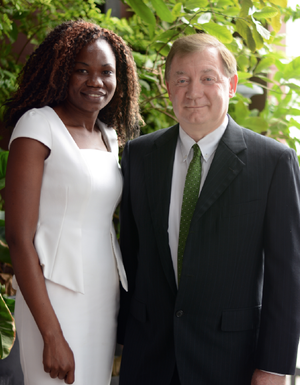 Mr Rogers with his partner, Miss Kevin Doris Ejon
Mr Rogers with his partner, Miss Kevin Doris Ejon Irish diaspora
“There is a huge Irish diaspora. We think there are probably almost 70 million people of Irish descent living abroad, including about forty million in the US and five million in Canada. Probably nine million people in Britain have Irish ancestry, and there are about 400,000 in Asia. We reckon that between 3,000 to 5,000 Irish nationals living in Thailand including a number of Irish people who live here for several months each year.
“The Irish diaspora includes a great many famous people. For example, the grandparents of John F. Kennedy came from Country Wexford. President Obama has Irish ancestors on his mother’s side. The ancestors of former President Reagan came from County Tipperary in Ireland as well.
“There are also a great many Irish natives of note, including James Joyce, the famous writer; Samuel Beckett, an avant-garde novelist; W.B. Yeats, the famous poet; Maureen O’Hara, an Irish-American actress; famous footballers like Roy Keane; and musicians in the groups U2, Westlife and Boyzone. The list goes on and on.”
Personal space
“I love films, reading books and running. I have run the New York, Dublin and Boston marathons. My partner and I have been running in Lumpini Park with the British and New Zealand ambassadors and other diplomats. We also run with a number of academics from Chulalongkorn and Thammasat Universities and CEOs from various banks. We sometimes meet on Sundays and run together.
“We also like to cycle at the Queen Sirikit Convention Center. My partner came in second in the women’s division in a race held for charity at the center a few months ago. We go to the cinema and we love to listen to music and to meet people. We like walking the streets and the markets of Bangkok – we like experiencing the real Bangkok. We spend a lot of time reading, and my partner is doing lots of writing.”
Final thoughts
“I want to send a special message to Thai students: If you come to study in our universities, you will receive a world class education, have a wonderful time, and hopefully, be a special ambassador for Ireland in years to come. We will warmly welcome you. Our universities are some of the best institutions of learning in the world. We speak the English language, we are a very welcoming and safe country.
“I meet graduates of Irish universities in Thailand as I move throughout the country and they all have very warm memories of their time in Ireland. We are setting up a Thai Alumni Network for Thai graduates of Irish universities.
“Thailand is very famous for its traditional dances and we also have a great love for our dances, like the very fast moving ‘River Dance.’ My partner and I have discussed merging some of the movements. Actually, we did this in March on Saint Patrick’s Day. It was fantastic. We would like to see more of that.
“Ireland is also famous for hospitality and for our drinks as well. I was delighted to see Irish whiskey and Guinness on sale here, and we would like to see more of our very good beers and fine wholesome foods on sale here.
“Lastly, I can’t emphasize enough the excellent working relationship my embassy has with the Irish community in Bangkok. They are a great source of support for us. I also want to mention the local St Patrick’s Society, which organizes a great St Patrick’s Ball each year. It is one of the highlights on the Irish calendar in Bangkok.”
“There is a huge Irish diaspora. We think there are probably almost 70 million people of Irish descent living abroad, including about forty million in the US and five million in Canada. Probably nine million people in Britain have Irish ancestry, and there are about 400,000 in Asia. We reckon that between 3,000 to 5,000 Irish nationals living in Thailand including a number of Irish people who live here for several months each year.
“The Irish diaspora includes a great many famous people. For example, the grandparents of John F. Kennedy came from Country Wexford. President Obama has Irish ancestors on his mother’s side. The ancestors of former President Reagan came from County Tipperary in Ireland as well.
“There are also a great many Irish natives of note, including James Joyce, the famous writer; Samuel Beckett, an avant-garde novelist; W.B. Yeats, the famous poet; Maureen O’Hara, an Irish-American actress; famous footballers like Roy Keane; and musicians in the groups U2, Westlife and Boyzone. The list goes on and on.”
Personal space
“I love films, reading books and running. I have run the New York, Dublin and Boston marathons. My partner and I have been running in Lumpini Park with the British and New Zealand ambassadors and other diplomats. We also run with a number of academics from Chulalongkorn and Thammasat Universities and CEOs from various banks. We sometimes meet on Sundays and run together.
“We also like to cycle at the Queen Sirikit Convention Center. My partner came in second in the women’s division in a race held for charity at the center a few months ago. We go to the cinema and we love to listen to music and to meet people. We like walking the streets and the markets of Bangkok – we like experiencing the real Bangkok. We spend a lot of time reading, and my partner is doing lots of writing.”
Final thoughts
“I want to send a special message to Thai students: If you come to study in our universities, you will receive a world class education, have a wonderful time, and hopefully, be a special ambassador for Ireland in years to come. We will warmly welcome you. Our universities are some of the best institutions of learning in the world. We speak the English language, we are a very welcoming and safe country.
“I meet graduates of Irish universities in Thailand as I move throughout the country and they all have very warm memories of their time in Ireland. We are setting up a Thai Alumni Network for Thai graduates of Irish universities.
“Thailand is very famous for its traditional dances and we also have a great love for our dances, like the very fast moving ‘River Dance.’ My partner and I have discussed merging some of the movements. Actually, we did this in March on Saint Patrick’s Day. It was fantastic. We would like to see more of that.
“Ireland is also famous for hospitality and for our drinks as well. I was delighted to see Irish whiskey and Guinness on sale here, and we would like to see more of our very good beers and fine wholesome foods on sale here.
“Lastly, I can’t emphasize enough the excellent working relationship my embassy has with the Irish community in Bangkok. They are a great source of support for us. I also want to mention the local St Patrick’s Society, which organizes a great St Patrick’s Ball each year. It is one of the highlights on the Irish calendar in Bangkok.”

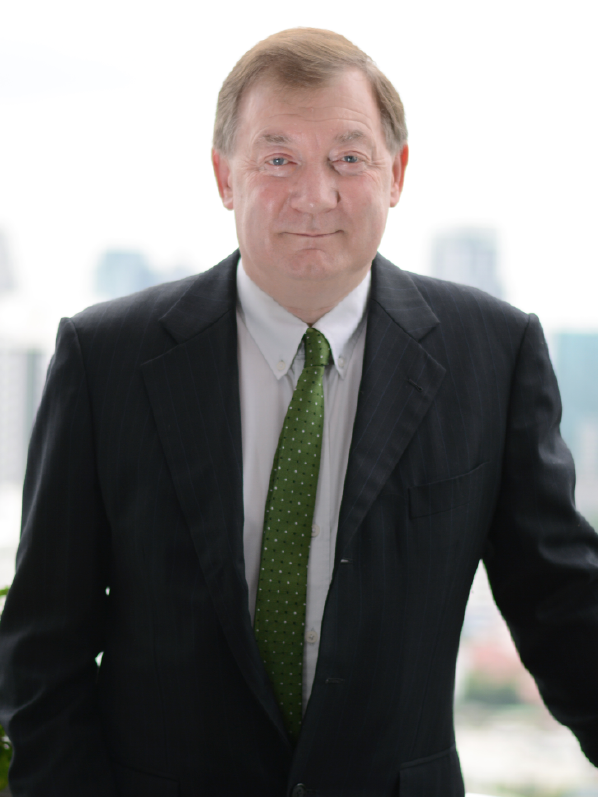
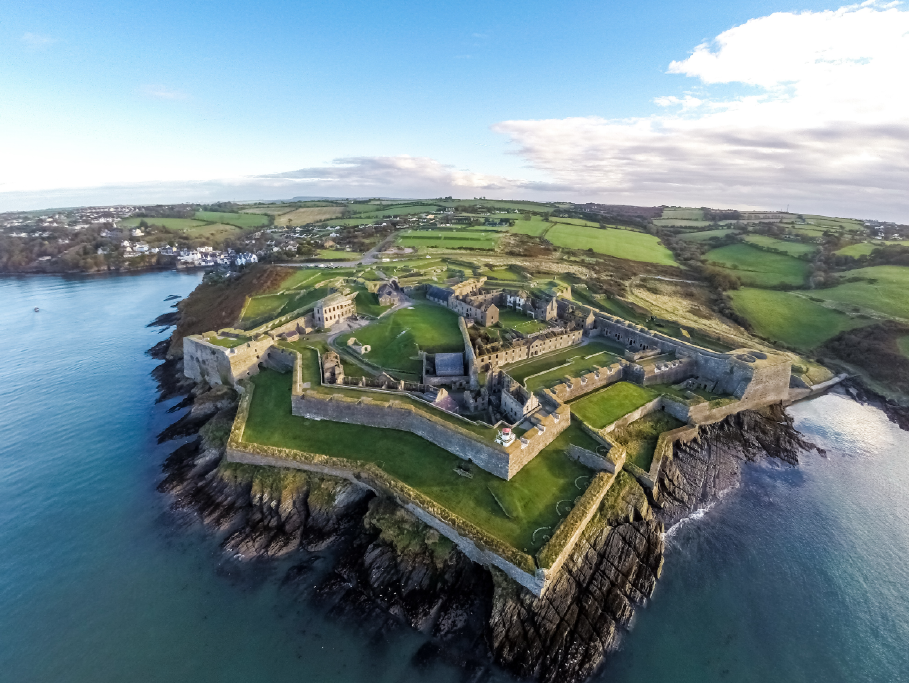
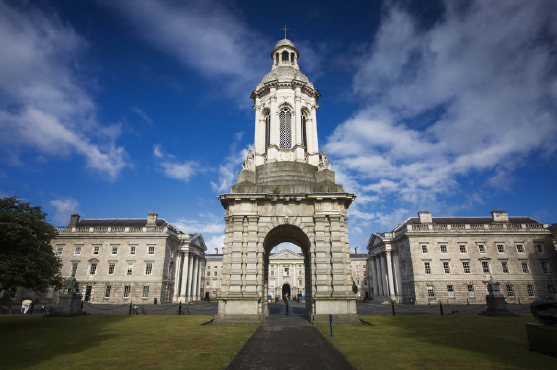
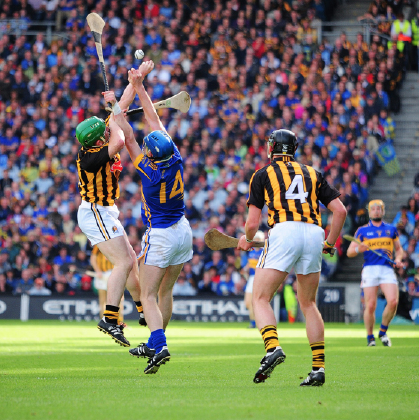
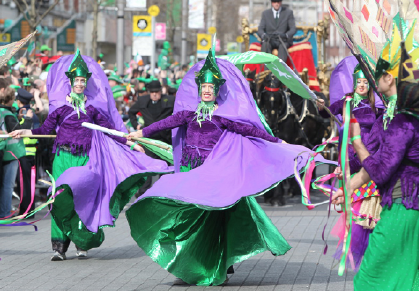
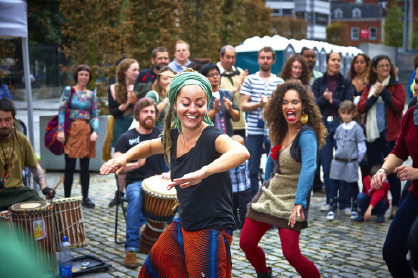
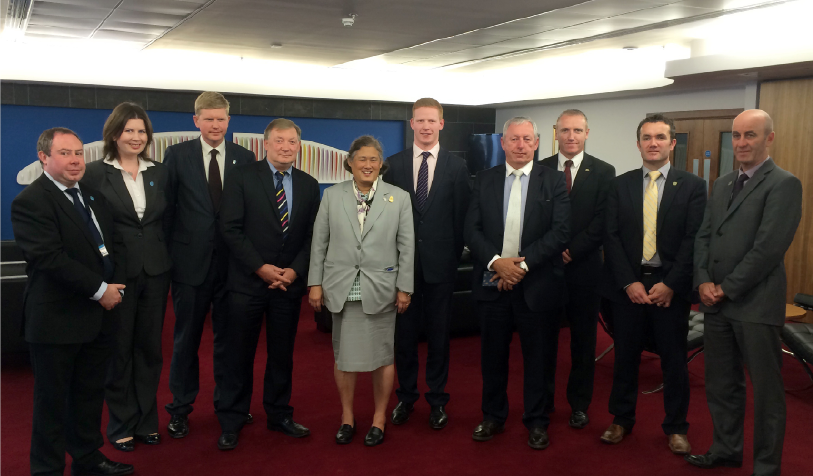
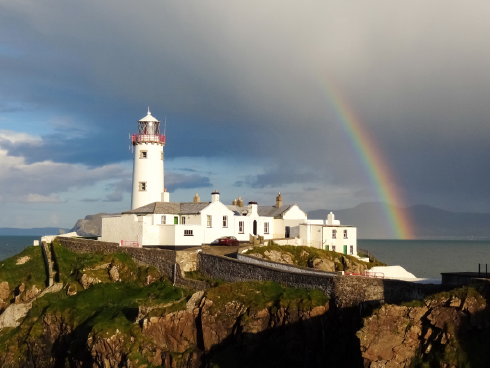
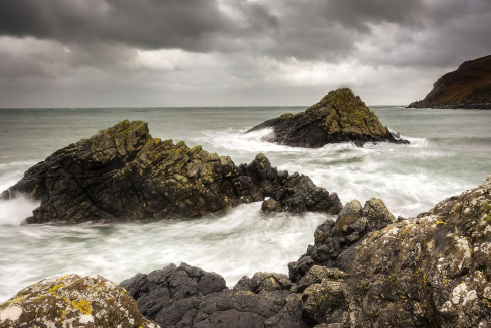
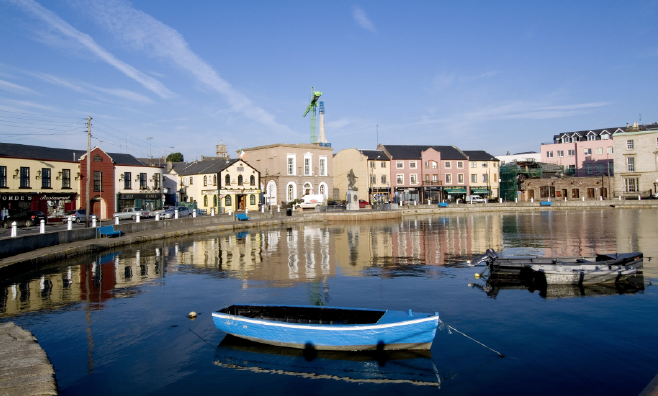
 RSS Feed
RSS Feed
















